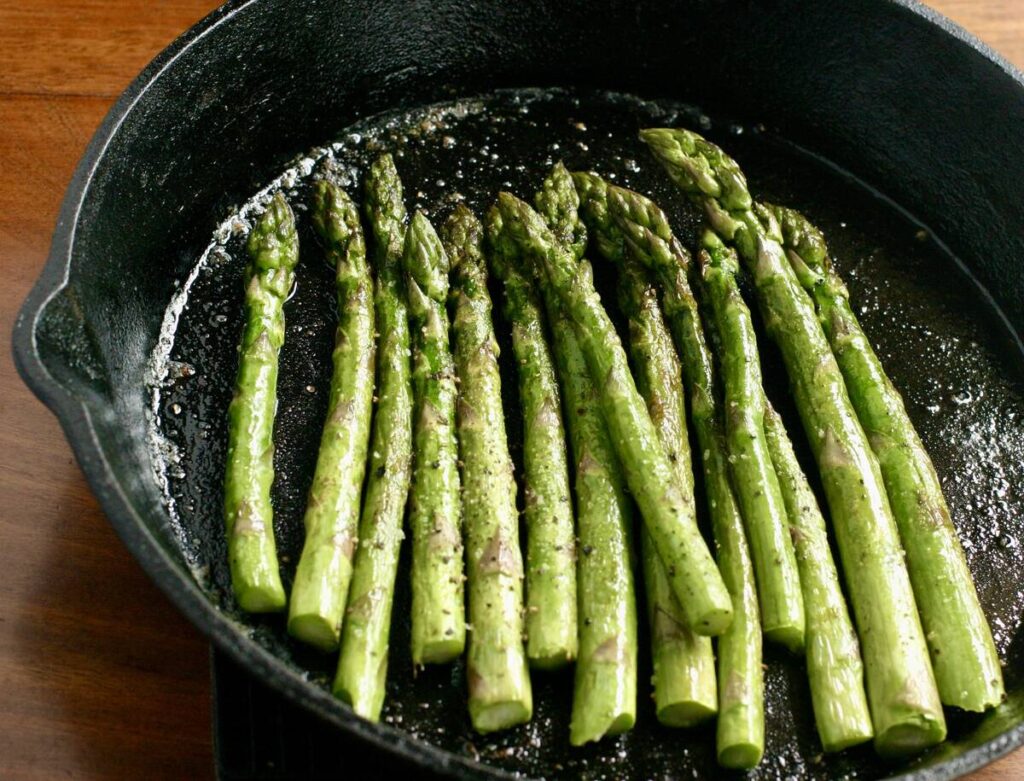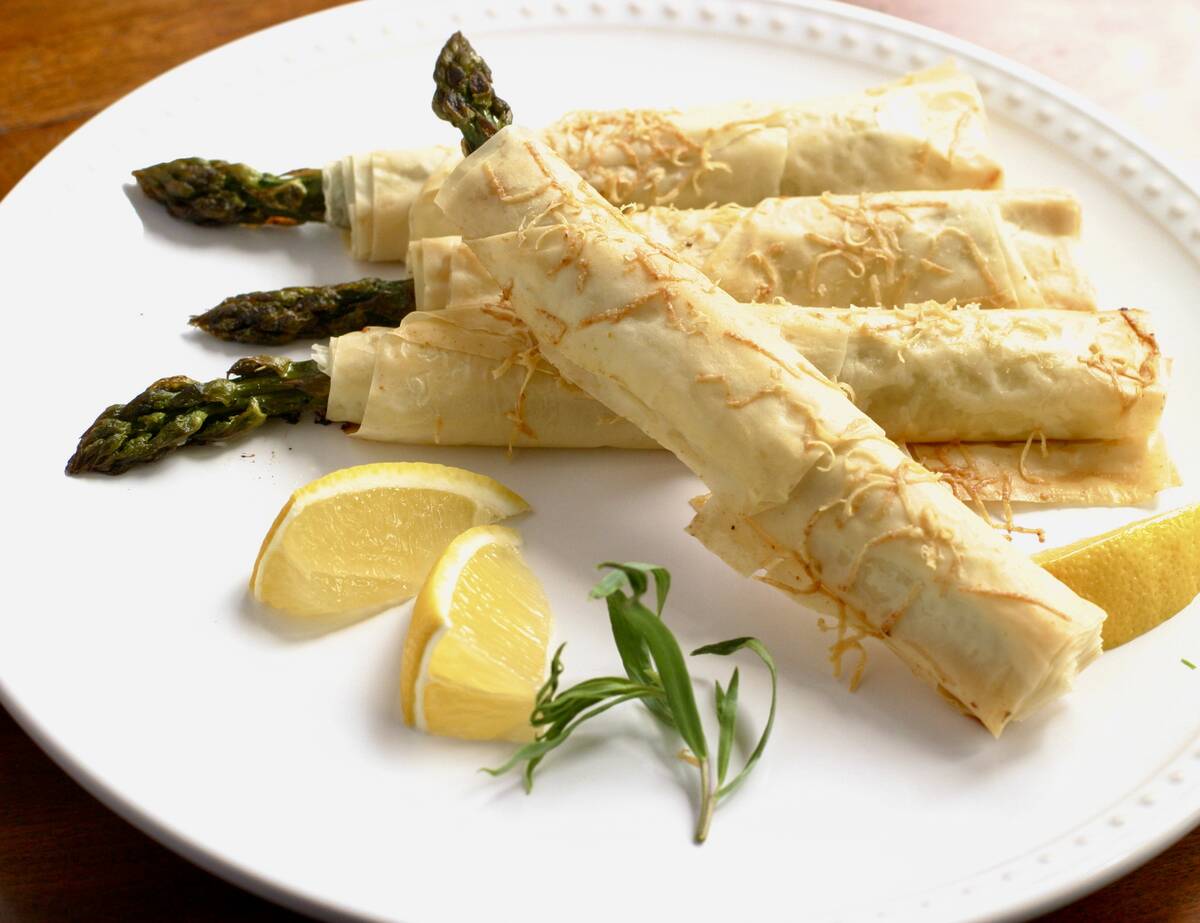Why not try dressing up your asparagus dishes this spring

Asparagus is one of the first signs that spring has finally arrived. We look forward to this fresh flavour every year.
Not only is asparagus delicious but it is a healthy choice. It is naturally low in fat and calories and high in fibre. This is an asset in a weight loss program.
It is rich in antioxidants, vitamins E and K and folic acid. Vitamin K is essential for bone health and folic acid helps the body make new cells.
Read Also


Alberta ag school ‘confident’ in new president and CEO
A longtime staff member of Olds College of Agriculture & Technology has passed a “rigourous process” to become the school’s new president and chief executive officer.
If you are shopping for fresh asparagus, look for bright spears with tightly closed tips. If the roots look dry, that is an indicator that the asparagus may be old.
Choose the spear thickness that works best for the cooking method you will use — thin asparagus for sautéing, fat asparagus for roasting or grilling and medium asparagus for just about anything.
The best way to store asparagus is to cut off an inch (2.5 cm) of the woody end and then stand the cut asparagus upright in a glass or mason jar.
Pour water into the glass until the bottoms of all asparagus spears are covered. Cover with the plastic produce bag from the grocery store. Let sit in the refrigerator until it is time to cook.
If you are planning on using the asparagus within three days of the initial purchase, you can simply store it in the crisper drawer, wrapped in a damp paper towel and then in a plastic bag.
The ends of asparagus can be woody and tough. Snap those ends off before cooking. Peel the thicker asparagus spears for maximum tenderness.
Although asparagus is delicious simply served with butter, salt and pepper, there are a few other flavour pairings that can change things up.
Lemon zest with or without lemon wedges on the side is a very popular way to serve it. A sprinkle of finely grated parmesan cheese or a sprinkle of toasted sliced almonds will finish it off nicely.
Garnishes such as finely chopped fresh mint or parsley are popular. A light drizzle of a thick balsamic vinegar works well, too.
Skillet Asparagus
- unsalted butter
- asparagus, woody bottoms snapped off
- kosher salt and freshly ground black pepper
Melt the butter In a large skillet set over medium heat. When the foam subsides, add asparagus and shake pan to coat the spears. Cover and cook, shaking occasionally, until bright green but still crisp, about three minutes.
Uncover and continue cooking until the asparagus is tender when pierced with the tip of a knife, five to 10 minutes more. Season to taste with salt and black pepper. Serve immediately.
Roasted asparagus
Simply toss prepared asparagus with a light drizzle of olive oil and a sprinkle of salt and pepper. Lay the spears out on a parchment lined baking sheet.
Bake at 400 F (200 C) until easily pierced through by a fork, which will vary depending on the thickness of your asparagus. Pencil-thin asparagus may be done in as little as 10 minutes. Thicker asparagus will need between 15 to 20 minutes.
Quick-pickled asparagus with tarragon and shallots
- 1 1/2 c. white wine vinegar 375 mL
- 1 1/2 c. water 375 mL
- 1/4 c. sugar 60 mL
- 1 tbsp. kosher salt 15 mL
- 3 or 4 stems of tarragon
- 1 large shallot, thickly sliced
- 1 lb. asparagus, woody ends snapped off 500 g
In a medium saucepan, combine vinegar, water, sugar and salt. Bring to a boil, stirring until solids are dissolved. Remove from heat.
Meanwhile, arrange asparagus and tarragon stems in a tall jar. Add the shallots. Pour in the vinegar mixture. Be sure that the asparagus spears are completely submerged in the brine. If not, top up with water. Refrigerate at least two days before eating. Will keep in the refrigerator for up to a month.
Asparagus soup with coconut milk and lemongrass
- 1 large onion, chopped
- 3 tbsp. unsalted butter or canola oil 45 mL
- 2 lb. asparagus, cut into 1/2-inch pieces 1 kg
- 1/2 tsp. black pepper 2 mL
- 1 1/2 c. coconut milk 375 mL
- 4 c. chicken or vegetable stock 1 L
- 3 stems lemongrass, pounded or cut to expose the interior
- 3 tbsp. ginger, finely chopped 45 mL
Cook onion with butter or oil in a large heavy pot over moderately low heat, stirring until softened, about 10 minutes.
Add ginger, asparagus and lemongrass pieces, salt and pepper and cook over medium heat, stirring frequently for about five minutes. Remove and reserve a few pieces of asparagus tips to garnish the soup later.
Add coconut milk and stock. Simmer, covered, until asparagus is very tender, about 15 minutes. Remove from heat.
Remove the lemongrass. Then puree soup in batches in a blender or with an immersion blender until smooth. If the soup is too thick, add more stock until the desired consistency is reached, and cook for about five minutes, or until the soup is warm.
Serve immediately or it can be refrigerated up to two days and reheated. Garnish with asparagus tips.
Phyllo wrapped asparagus
- 16 asparagus spears
- phyllo pastry, thawed
- 1/2 c. butter, melted 125 mL
- 1/2 c. Parmesan cheese, grated 125 mL
Preheat oven to 375 F (190 C).


Wash and snap off the tough ends of the asparagus. Peel the stems.
Unwrap the phyllo and cut lengthwise so that the sheets will be wide enough to fit the length of the asparagus spears. Keep phyllo covered with a dampened kitchen towel until ready to use. This will prevent the phyllo sheets from drying out while you are working.
Take one sheet of phyllo and brush lightly with melted butter. Sprinkle with Parmesan.
Place one asparagus spear on the phyllo and roll up, jelly-roll style. Place on a parchment covered baking sheet. Brush with more melted butter and sprinkle with more Parmesan. Repeat until all the asparagus spears are used.
Place baking sheet in oven and bake for 15 to 18 minutes, or until golden brown and crispy. Serve immediately.
Sarah Galvin is a home economist, teacher and avid supporter of local food producers. She has been a market vendor, grew up on a farm in southeastern Saskatchewan and is a member of TEAM Resources.
Source: producer.com


